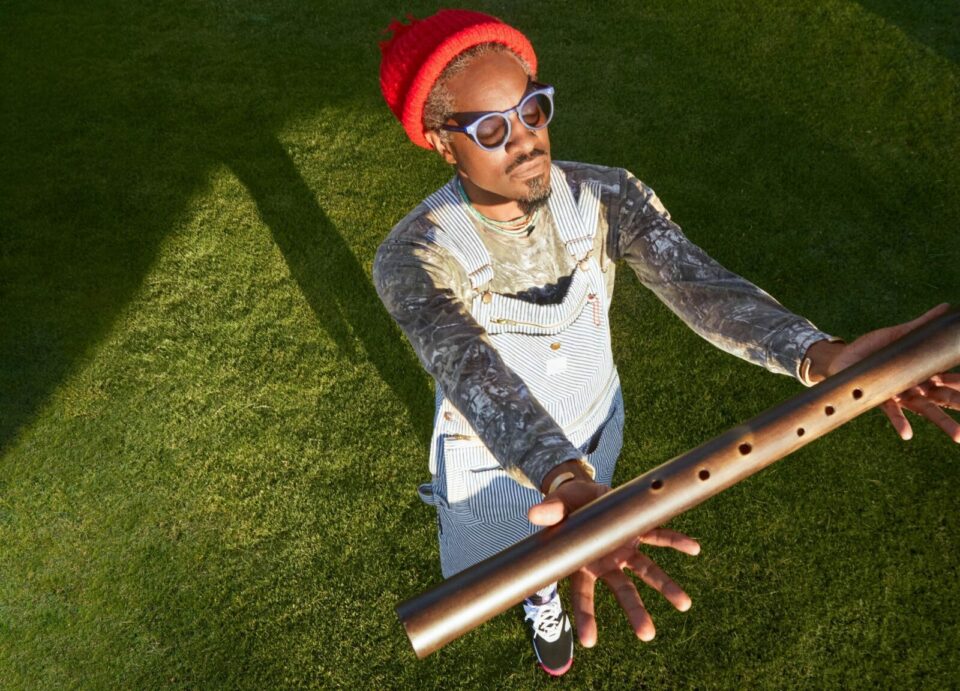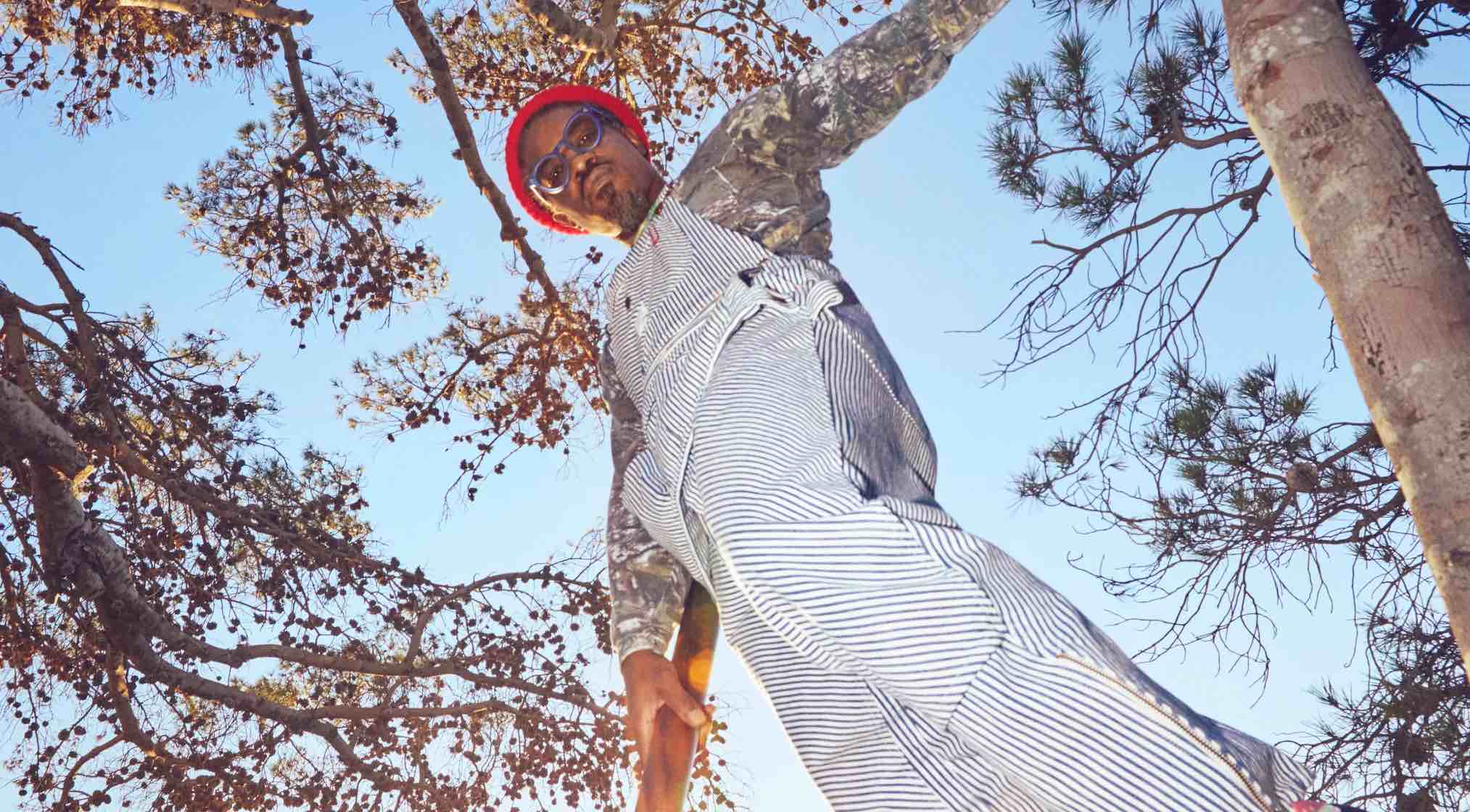Twenty years after its release, it’s still hard to wrap your head around “Hey Ya!” Snappy, a little sad, and almost disturbingly hard to shake once it’s wedged in your brain, André 3000’s first hit single as a solo artist—even if it was credited to OutKast—reaches the level of pop nirvana where it’s hard to believe it was composed by a living, breathing human being, and not just manifested by the universe itself. It was one of the last truly universal smashes, sweeping radio charts across the demographic spectrum, and introducing a sound—retro soul spiked with taut, punkish melodies and a little hip-hop swagger—that remains a massively successful pop subgenre to this day. Labels, A&Rs, and managers for years have pushed artists to make their own “Hey Ya!,” and producers and consultants have dissected it over and over again hoping to explain and reproduce its singular ability to connect.
“Hey Ya!” made André the biggest kind of pop star imaginable, and in the years to follow, as his output became less frequent and more puzzling, it seemed like he was doing everything he could to keep it from happening again. His unmatched creative run with OutKast tapered to a trickle of guest verses for other artists. During what could’ve been a triumphant reunion with Big Boi in 2013, a decade after releasing their last studio album, he was openly prickly about being treated as a nostalgia act (the duo did make a brief festival run in 2014). After dropping a run of features in 2016, he almost entirely stopped releasing new music altogether. For years the only real way to tap in with one of our era’s most creative musical minds has been social media posts by randos filming chance encounters on the street with André, a carved wooden Mayan double flute in hand, playing his way through the world like a wandering piper from some archaic myth.
His proper debut album, New Blue Sun, answers at least one of the bigger questions that André’s career path over the past decade or so has raised, which is where the flute thing was headed. Ever since it first appeared in a tweet in 2019, his flute has been a memetic stand-in for everything his fans, especially the younger ones, love him for: his charismatic audacity, his kindness to strangers, his self-actualization far beyond worrying whether he might be verging on self-parody. But was the music any good? Did he even know how to play that thing? It was hard to tell.
For one of the most universally loved artists on the pop landscape to release an 87-minute instrumental album—with, like the warning sticker on the album says, “no bars”—constitutes a radical, even revolutionary act.
Over the course of the eight compositions that make up New Blue Sun, André plays woodwind lead for an ensemble that includes former Mars Volta drummer Deantoni Parks and co-producer (and influential DJ) Carlos Niño, taking them through a range of sonic textures and into some surprisingly emotional places. Album opener “I Swear, I Really Wanted to Make a ‘Rap’ Album but This Is Literally the Way the Wind Blew Me This Time” bridges the gap between hip-hop and ambient music, with slowly shifting chord samples rippling through layers of chirping birds and cymbal washes, and André, on MIDI wind controller, playing looping and patiently evolving fractal melodies. It’s soothing but uplifting, unhurried but not boring; every time I put it on I find myself exhaling fully for the first time in who knows how long and letting go of more stress than I realized I was carrying.
From the song titles on down, it’s a playful record, and André seems eager to pay tribute to the influences he’s been exploring—Alice and John Coltrane, synth explorers of the early analog era, Aphex Twin, the landmark 2017 ambient compilation Mono No Aware—but he’s also doing serious work. On the technical side, he’s found interesting ways to play electronics and live instrumentation off each other until they blend together organically, showing a range of approaches to his instrument that make it hard to believe he’s only been playing for a few years. There’s also something tangibly spiritual about his playing, a sense that he’s tapping into music’s most primal mission, which is to pierce the veil between human consciousness and the divine.
Some of it is extremely good. One track is questionable: “That Night in Hawaii When I Turned Into a Panther and Started Making These Low Register Purring Tones That I Couldn’t Control ... Sh¥t Was Wild” channels the more “exotic” end of ’90s new age music in a bad way and comes out sounding like something I imagine would go off at a Williamsburg tech-bro ayahuasca ceremony. But the album rewards repeat listening and an open mind. “BuyPoloDisorder’s Daughter Wears a 3000® Shirt Embroidered” meanders through nearly seven of its 13 minutes struggling to weave together heady retro-jazz psychedelia, Tangerine Dream–style digital ambience, and, confusingly, surf-rock organ before blossoming suddenly into a staggeringly gorgeous second half that didn’t connect with me emotionally until the third listen, when it came out of nowhere and completely wrecked me.
But it kind of wouldn’t matter even if the album was bad. New Blue Sun’s greatest triumph is simply being what it is. In the streaming era, pop music has become a space of unlimited freedom and oppressive constraints. On one hand, digital recording tools and the erosion of genre barriers have allowed artists a breathtaking range of expression. On the other, their viable options for turning that expression into food on the table have increasingly fallen under the fickle control of playlist curators, algorithms, and social media audiences. New artists face a choice between starving or sticking to a strict set of rules for maximizing engagement: nothing over three minutes, no instrumental breaks, quantity over quality. So for one of the most universally loved artists on the pop landscape to release an 87-minute instrumental album, with tracks pushing beyond 10 minutes apiece—and, like the warning sticker on the album says, “no bars”—constitutes a radical, even revolutionary act. Even more so for it to come from the creative mind who inadvertently helped lay down the formal rules of streaming-age pop songwriting that a generation of young artists have been penned in by.
André and OutKast have been openly anti-oppression from the start, and New Blue Sun delivers its message of liberation stronger instrumentally than André ever did using words.
I recently came across a quote from writer Arundhati Roy’s post-9/11 book War Talk: “Our strategy should be not only to confront empire, but to lay siege to it. To deprive it of oxygen. To shame it. To mock it. With our art, our music, our literature, our stubbornness, our joy.” If we understand “empire” as the entire late-capitalist drive to leave no resource (whether it’s petroleum deposits or human creativity) un-“maximized for shareholder profit,” the streaming-based music industry, increasingly dominated by hedge funds and hostile to artists who want to be paid for their work, certainly counts. André and OutKast have been openly anti-oppression from the start, and New Blue Sun delivers its message of liberation stronger instrumentally than André ever did using words.
It’s a joyful album, not just because the melodies feel nice, but because you can feel the artist pouring as much joy into the music as their soul can deliver. It’s stubborn in its uncompromising insistence on taking up as much space, as much time, and as many points on the musical compass as it needs. André’s commitment to following his muse wherever it takes him, as far as he needs to go, shames and mocks the idea of reducing the wonder of musical expression to an algorithm. It was clear as soon as New Blue Sun hit streaming how badly it was needed, how desperately music fans have been waiting for this kind of gesture. The first weekend it was out, I saw the cosmic-jazzy “The Slang Word P(*)ssy Rolls Off the Tongue with Far Better Ease Than the Proper Word Vagina . Do You Agree?” posted all over socials like it was the month’s big club banger. The album sold more copies in the first week than Ice Spice. It’s the most “uncommercial” hit record of the year.

And its impact will probably only grow. André’s music with OutKast took decades to reach its full cultural influence, and there’s no reason to suspect that New Blue Sun won’t have a similarly long tail. It already feels destined for the musician’s-musician canon, a work like Stevie’s Talking Book or Bowie’s Berlin trilogy that creatively ambitious artists will be wrestling with for generations, trying to figure out its secrets the same way music consultants continue to figure out how to reproduce “Hey Ya!”’s unceasing appeal. Are young rappers going to suddenly start putting out albums of experimental ambient music? Probably not. But is it going to get more of them, and more musicians of all types, asking themselves hard questions about whether they’re being true enough to themselves, honest enough with their work, and taking enough chances with their art? Most definitely. And as recent events have shown us, once someone wakes up to the ways in which they’re being oppressed, it’s hard to get them to accept letting it happen.
New Blue Sun is full of music that will untangle your energy, raise your vibration, and smooth out whatever rough edges life is putting in your way—but beneath all of the new age flute riffs, it’s a ticking time bomb. FL







